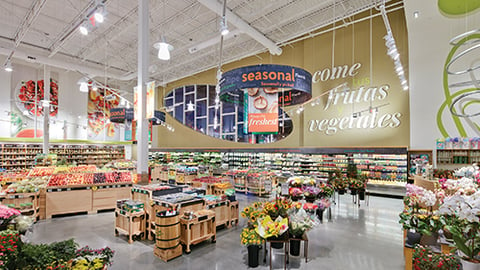4 Benefits of Propane Forklifts for Grocery Retailers
Behind the success of every grocery store is its people, its products, and likely one or more workhorse forklifts used for moving pallets from deliveries, inside warehouse storage, and to and from cold storage. These machines tackle the jobs too heavy for pallet trucks and hand carts and are a vital piece in keeping deliveries on schedule.
But not all forklifts are the same. Taking a closer look can help grocery retailers and warehouse facilities prevent additional costs and downtime. There are four key benefits of propane-powered forklifts for grocery retailers to take into consideration: reduced emissions, versatile use, cost-effectiveness, and reliability.
1. Propane produces lower emissions
The grocery industry is seeing a greater push toward more sustainable operations. This trend has helped introduce more electrification solutions, but when it comes to forklifts, propane is keeping pace in helping the industry become greener as well. Propane forklifts have a low-emissions profile, producing significantly fewer emissions than diesel, and even electric or battery forklifts when looking at the full energy cycle.
In fact, when comparing site-to-source emissions, propane forklifts produce up to 76% fewer sulfur oxide (SOx) emissions than electric forklifts, according to a comparative emissions analysis of forklifts done by the Propane Education & Research Council in partnership with the Gas Technology Institute. Site-to-source emissions include all the emissions produced at power plants where electricity is generated — many of which are still coal-fired — as well as the emissions during transportation to the facility.
Propane is cleaner when compared with diesel forklifts too. Best-in-class propane forklift engines can produce 97% fewer hydrocarbon and NOx emissions when compared with similarly sized diesel forklift engines. Additionally, propane forklifts reduce greenhouse gas emissions by up to 16% compared with gasoline forklifts.
2. Propane forklifts are versatile
Propane’s reduced emissions provide grocery retailers and warehouses with another advantage as well: versatility. Because of the energy source’s low-emissions profile, propane forklifts are able to be used outside and indoors.
With proper indoor ventilation, operators are safely able to run propane forklifts from loading bays straight to indoor storage with no need for additional equipment, enabling greater productivity throughout the day. And long-term use in cold storage won’t cause damage to propane forklifts, which can be safely used in facilities even below zero degrees, where the effectiveness of electric forklifts batteries is reduced when exposed to cold temperatures for long periods.
Propane forklifts are also fully capable of working outside, even in less-than-ideal conditions. With propane, operators can count on uninterrupted operation, whereas working outdoors in rain or snow would otherwise need to be delayed to prevent damaging electric equipment.
And when it comes to load capacity, propane forklifts offer more versatility than electric. Propane forklifts are available in all weight classes to match the job at hand, where electric forklifts may not be up to the task of carrying the weight of large jobs, and diesel isn’t fit for lighter tasks.
3. Propane forklifts are more cost-effective
No matter where a grocer is located, propane can provide a cost-effective solution for its material handling needs. Propane has an established delivery and exchange system for propane refueling across the United States, making it accessible in both urban and rural areas.
Grocery retailers and warehouse managers can make using propane even more cost effective by setting a refueling contract with their local propane supplier, which can lock in the price for a period of time and save retailers from energy price fluctuations if electric costs go up.
Additionally, the capital cost of a propane forklift is almost 30% lower than the purchase price of an electric forklift. The life expectancy of a propane cylinder is also three times longer than the life expectancy of an electric forklift battery and extends beyond the typical lifespan of a forklift. Over time, electric forklifts’ battery life and power output diminishes, too, and can lead to future costs, including additional expensive batteries. And in many cases, proper disposal or reconditioning of electric forklift batteries can be a costly proposition.
And beyond the initial equipment purchase and the cost of propane itself, all that facility managers and business owners are responsible for is maintenance and storing the cylinders — which they can either purchase or lease from their propane supplier.
4. Propane forklifts are reliable
For modern grocery facilities, whether retailer or warehouses, business can often run 24 hours a day. Propane forklifts provide 100% power throughout operation, pushing heavy loads at full capacity faster and longer than electric forklifts. One cylinder typically covers an entire eight-hour shift. In addition, propane forklifts maintain more consistent travel speeds and acceleration throughout a shift compared to battery-powered forklifts, according to data from PERC.
By considering propane forklifts, grocery retailers and warehouse facilities can see advantages including reducing emissions and increasing productivity, and will have a cost-effective, accessible, and reliable energy source to move its products.









